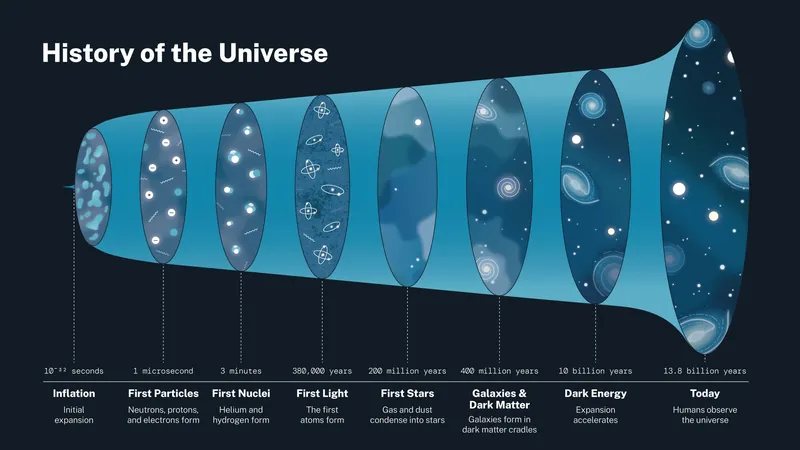
New Study Throws a Curveball at Dark Energy: Is It Just an Illusion?
2025-01-01
Author: Jia
Introduction
In a groundbreaking development in cosmology, a new study suggests that dark energy—previously thought to be a fundamental component driving the expansion of the Universe—might not even exist. Dark energy has long been a cornerstone of modern cosmological theories, typically represented by a cosmological constant in Einstein's theory of general relativity. This mysterious force has been used to explain why the Universe continues to expand at an accelerated rate. However, inconsistencies in observational evidence are raising eyebrows within the scientific community.
Hubble Tension Problem
One prominent issue, known as the Hubble tension problem, highlights discrepancies in measurements concerning the rate of cosmic expansion. Essentially, different observational methods yield varying outcomes, prompting experts to question the reliability of our current models. Moreover, while dark energy is conventionally presumed to be uniformly distributed across the cosmos, new evidence hints that this uniformity may not hold true.
The Timescape Model
The latest research employs data from the Pantheon+ project, which analyzes a collection of Type Ia supernovae, to assess the validity of the standard cosmological model against an alternative known as the Timescape model. Unlike the standard model that assumes cosmic expansion is homogeneous, the Timescape model posits that gravitational fields create time discrepancies that could give the perceived effect of expansion. This model proposes that clocks within gravitational wells—such as galactic clusters—run slower compared to those in vast empty regions. Over billions of years, this time dilation could manifest as an illusion of a uniformly expanding Universe.
Findings and Implications
Interestingly, the findings from the Pantheon+ dataset support both the standard model and the Timescape model; however, they favor the latter slightly more. This nuanced support implies that while dark energy might be an illusion, the study stops short of fully dismissing the established cosmological model.
Conclusion
If subsequent investigations continue to bolster the Timescape theory, we could witness a seismic shift in our understanding of the cosmos. However, caution is warranted. The Timescape model is just one of several alternative frameworks available, and it also features its own unresolved complications that need addressing. This revelation underscores the dynamic nature of astronomy; as new data is collected and analyzed, the very foundations of our understanding of the Universe may be challenged. The era ahead promises thrilling advancements in our knowledge of cosmic phenomena, reigniting the debate over the nature of the very fabric of space and time. As we explore these cosmic mysteries, one question remains: Could dark energy, the pillar of modern cosmology, be nothing more than an elaborate illusion? Stay tuned as this saga unfolds!
 Brasil (PT)
Brasil (PT)
 Canada (EN)
Canada (EN)
 Chile (ES)
Chile (ES)
 Česko (CS)
Česko (CS)
 대한민국 (KO)
대한민국 (KO)
 España (ES)
España (ES)
 France (FR)
France (FR)
 Hong Kong (EN)
Hong Kong (EN)
 Italia (IT)
Italia (IT)
 日本 (JA)
日本 (JA)
 Magyarország (HU)
Magyarország (HU)
 Norge (NO)
Norge (NO)
 Polska (PL)
Polska (PL)
 Schweiz (DE)
Schweiz (DE)
 Singapore (EN)
Singapore (EN)
 Sverige (SV)
Sverige (SV)
 Suomi (FI)
Suomi (FI)
 Türkiye (TR)
Türkiye (TR)
 الإمارات العربية المتحدة (AR)
الإمارات العربية المتحدة (AR)